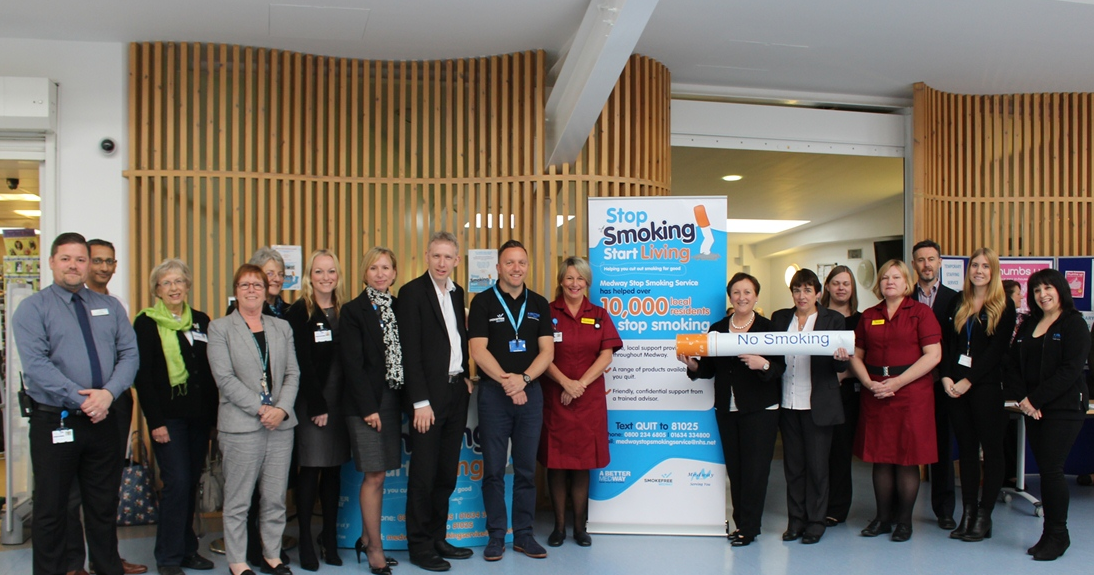
A few months ago I wrote to all NHS Trusts in England asking for their commitment to work with PHE towards a completely tobacco-free NHS.
Smoking remains the single largest cause of premature death, and accounts for half of the health gap between the poorest and the most affluent people.
Working with all of our partners, PHE will continue to fight tobacco. One of our aims is to help the NHS become truly tobacco-free. This means:
- Everyone understanding that there is no smoking anywhere on NHS property, including the grounds
- All front line staff starting conversations about smoking with patients
- Stop smoking support offered on site or referral to local services
It is great to see some trusts already working towards this, and in this blog I want to highlight Medway NHS Foundation Trust as an example of an organisation showing practical thinking and taking innovative action towards becoming truly tobacco-free.
Medway Maritime Hospital in Gillingham is Kent’s busiest hospital, seeing around 400,000 patients every year. In October 2016, after robust planning and preparation, the trust went smokefree, working with staff, patients, visitors, contractors, the local council and community to make smoking anywhere on their site a thing of the past.
Alongside this, quitting advice and support is available for smokers, whether they are patients, staff or visitors.
Here are Medway’s five tips for going smoke-free
1) Provide support to quit not just for patients, but also staff and visitors
Quite rightly, nicotine replacement therapy (NRT) is available on every ward for patients at Medway Maritime Hospital, meaning any patient admitted who is a smoker can not only try the therapy, but has the opportunity to discuss quitting.
The trust trained all ward staff to be able to start conversations about smoking and give advice on cessation. Patients visiting the hospital as outpatients will also see the very visible advertisements of the local stop smoking service.
There are several ways for staff to refer smokers to the local service, including by phone, paper or an online form, making it accessible around the hospital site.
While helping patients is vital, it is also important to support staff, as an engaged workforce will make success much more likely. Staff were offered free NRT for two months in the lead up to the smoke-free start date.
The Stop Smoking Service is also very visible within the hospital grounds, with posters, banners and an information stand that can offer advice to visitors as well as patients.
2) Create a team of stop smoking champions
Medway flags the introduction of stop smoking champions as one of their greatest successes in this area. Enforcing the ban will need more than just signage and prompts, and staff who volunteer to become ‘smoke-free champions’ take part in an extensive programme to ensure their time spent on this is as effective as possible.
Wearing badges to ensure they are clearly visible, champions look out for people smoking on site and remind them that the area is smoke-free and that they will need to leave the site to smoke.
The champions have been trained by the local stop smoking service to offer practical advice on quitting and are well briefed on what patient’s people can expect when taking part in a cessation programme.
3) Leadership needs to be strong and from the top
Work to enforce their smoke-free status is fully supported by Medway Chief Executive Lesley Dwyer. Getting support from senior staff and ensuring their full engagement – which might include senior staff also asking people to stop smoking on grounds for example – sends a message to the workforce that everyone needs to get behind this message.
4) Communication, communication, communication
It is essential to have a strong communication strategy both externally and internally.
Staff should be well briefed, with regular internal communications to ensure as many staff members as possible are on board and appropriate forums and opportunities to allow people to express concerns and find out more information.
From an external point of view, aside from promoting the smoking ban as widely as possible, smaller changes make a difference too. At Medway, patient letters were updated to clearly state that Medway is a smoke-free trust, contractors and local residents were also written to and smoke-free adverts were put up in the local area as well as on hospital grounds.
Letters sent by the local council to residents also include a reminder not to smoke on hospital grounds.
5) Work closely with the estates team
At Medway, the support of the estates team made a big difference in implementing smoke-free policies. With responsibility for maintaining and looking after hospital grounds and buildings, this team plays a key role in making sure that people understand and respect that smoking is not permitted.
The trust also employed temporary wardens to patrol the grounds and enforce the ban. Wardens have helped increase the visibility of a ban on smoking and actively ask people to leave or stop smoking, making the smoke free message clearer and stronger.
If you work for an NHS Trust which has done a lot of work on making your hospitals tobacco-free, let us know. We’re looking for examples of successful, innovative work that can help others in our work to see a tobacco-free NHS.
